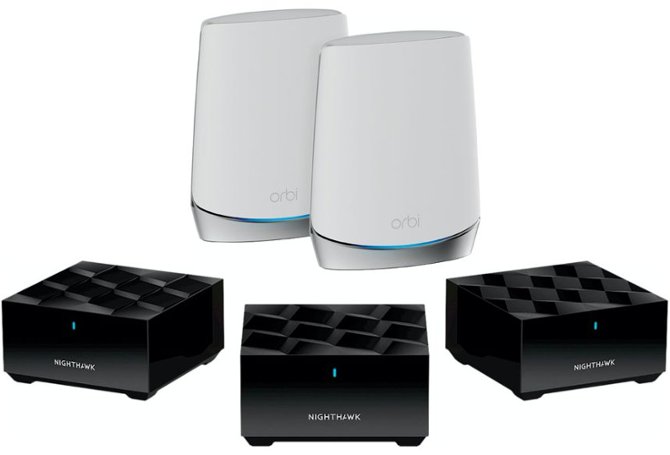Mesh Wi-Fi vs. Wi-Fi Extender: Which Is Better for Your Home Network?

carousel
Mesh Wi-Fi: the future of home networking
Mesh Wi-Fi is often hailed as the future of home networking, and for good reason—but what is mesh Wi-Fi, and why might you need it? This innovative system uses multiple devices, typically referred to as nodes, to create a web-like network that blankets your entire home in a seamless Wi-Fi network signal. Each node in a mesh Wi-Fi system communicates with the others, ensuring a consistent and uninterrupted connection throughout your home.
One of the primary advantages of mesh Wi-Fi is its ability to eliminate dead zones. With traditional routers, dead zones can occur due to the limitations of a single device's coverage. Mesh Wi-Fi, on the other hand, relies on a network of nodes that work together to fill in those gaps. This makes mesh Wi-Fi an excellent choice for larger homes or spaces with numerous obstacles, such as thick walls and multiple floors.
In addition to eliminating dead zones, mesh Wi-Fi also excels at load balancing. This means that the system can intelligently route your devices to the node with the strongest signal, ensuring that each device gets the best possible connection. This feature is particularly beneficial in homes with numerous devices and heavy internet usage.
Wi-Fi extender: a reliable solution for better coverage
Wi-Fi extenders, also known as Wi-Fi repeaters or range extenders, are another great tool for improving Wi-Fi coverage. These devices work by capturing an existing Wi-Fi signal and retransmitting it, effectively extending the reach of your network. Learning to use a Wi-Fi extender is easy, from set up to connecting to your network. They’re also generally more affordable than mesh Wi-Fi systems, making them an attractive choice for those on a budget.
Wi-Fi extenders are particularly useful when you have a specific area or room in your home that suffers from weak signal strength. They can help eliminate dead zones in these localized areas, providing a convenient solution for improving a home office or entertainment spaces.
One of the key differences between mesh Wi-Fi and Wi-Fi extenders is the way they handle network management. While mesh Wi-Fi systems create a unified network with a single network name (SSID), Wi-Fi extenders typically create a separate network name (SSID). This means that as you move from the main router to the extender's coverage area, you may need to manually switch your device to the stronger network.
Comparing the two technologies: mesh Wi-Fi vs. Wi-Fi extenders
1. Coverage area
Mesh Wi-Fi excels at providing consistent coverage throughout larger homes, making it the best choice for eliminating dead zones across a wide area.
Wi-Fi extenders are more suitable for specific areas with signal issues, making them a cost-effective solution for localized dead zones.
2. Network management
Mesh Wi-Fi simplifies network management by creating a single network name (SSID) and automatically routing devices to the strongest signal, ensuring a seamless transition as you move around your home.
Wi-Fi extenders require manual network switching when moving between the main router and the extender's coverage area, which can be less convenient. However, if you’re using separate devices in different areas within your home, you might simply dedicate them to their individual networks if possible to solve this problem.
3. Scalability
Mesh Wi-Fi systems are designed to be expandable, allowing you to add more nodes to the network as needed. This scalability ensures that your network can grow with your requirements.
Wi-Fi extenders are less scalable, as adding multiple extenders can lead to network congestion and reduced performance.
4. Performance
Mesh Wi-Fi tends to offer more consistent and high-performance coverage, making it the preferred choice for demanding applications like online gaming and 4K streaming.
Wi-Fi extenders may experience some signal degradation due to the retransmission process, which can affect performance for bandwidth-intensive tasks.
Choosing the best Wi-Fi booster for you
Looking at mesh Wi-Fi vs. Wi-Fi extenders, a mesh network might be the more universally preferable option, with its fluidity and reliable signal strength. However, the choice depends on your unique requirements and budget. If you have a larger home with multiple dead zones and demand high-performance coverage, investing in the best mesh Wi-Fi system is likely the right choice.
On the other hand, if you're looking for an affordable solution to improve the signal in a specific room or area, a Wi-Fi extender is a cost-effective option that still works great within its own capacity.
Ultimately, whether you opt for mesh Wi-Fi or a Wi-Fi extender, both technologies have their place in addressing Wi-Fi coverage issues. The key is to assess your home's unique needs, network demands, and budget to determine which solution is the best fit for your situation. By making an informed decision, you can enjoy seamless and reliable connectivity throughout your home.